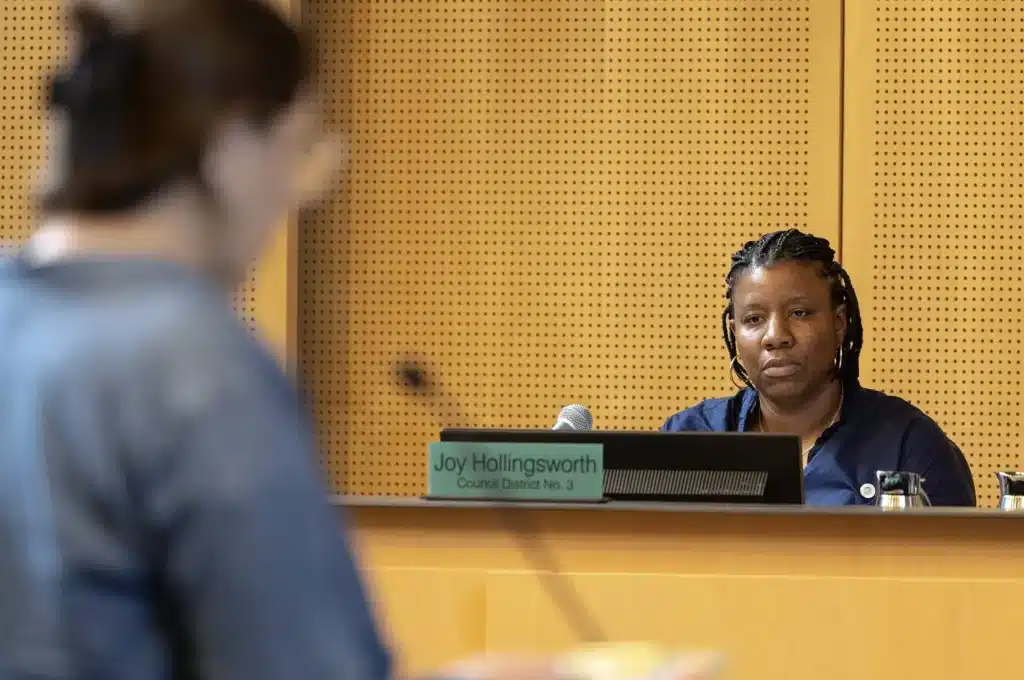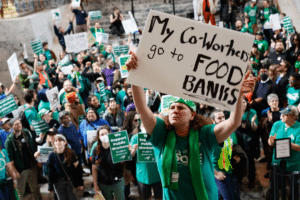
Seattle City Councilmember Joy Hollingsworth listens to public comments about a minimum wage law on Tuesday. (Nick Wagner / Seattle Times)
By David Kroman
Seattle Times
Seattle City Councilmember Joy Hollingsworth is backing down from a bill, introduced just a week ago, that would have slowed the city’s minimum wage increase for small businesses next year.
The decision comes after pushback — online, in print and in public comment earlier this week — accusing Hollingsworth of selling out low-wage workers and reneging on a deal struck a decade earlier.
At the same time, the decision is certain to frustrate many owners of small businesses in the city, particularly in the restaurant industry, who have said the more than $3 an hour jump next year could represent a death blow to their businesses after a difficult few years since the pandemic.
The turnaround is part of a pattern emerging at City Hall by new council members, who seem to wobble under blowback to divisive legislation.
Upon introducing the bill, Hollingsworth emphasized she was trying to start a conversation about the forces that make it difficult to operate a restaurant in Seattle. She said it was an issue she’d be happy to revisit in the coming months and years and that her bill was simply an opening salvo.
But labor and worker advocates — as well as former Councilmember Kshama Sawant, whom Hollingsworth replaced on the council — did not see it that way. Rather, they viewed the bill as a betrayal in a city that has, in part, defined itself over the last decade by its nation-leading minimum wage.
“My initial proposal was never an end, but the beginning of a process,” Hollingsworth said in a statement Friday. “I look forward to the next few weeks to focus on working with stakeholders, including small business owners, labor unions, and our Mayor’s Office to find a balanced solution.”
At issue is the expiration next year of a carve-out for small businesses. When business and labor leaders negotiated the minimum wage in 2014, they agreed to a 10-year phase-in for anyone with 500 or fewer employees. Those businesses would be allowed to credit tips and benefits toward the minimum wage, effectively allowing them to pay a lower rate than those with more than 500 workers.
That credit is scheduled to go away next year, eliminating what is currently a two-tier system and making the minimum wage the same for everyone. In effect, that will hike the base pay rate by more than $3 an hour for many establishments, when combined with the typical annual adjustments.
Industry representatives have said that hike could cost them dearly and began pushing council members to extend the credits permanently. The pandemic and inflation have been hard enough, they argued. Hollingsworth, whose district includes Capitol Hill, was sympathetic and took up the cause.
As word spread, those involved in the initial negotiations accused the council of invalidating a hard-fought compromise and creating arbitrary differences between businesses with 499 employees and those with 501. During the public comment period earlier this week, council members heard an earful from upset advocates.
Reacting to Hollingsworth’s decision to withdraw her bill, Jeff Reading, spokesperson for the Seattle Restaurant Alliance, said the increase next year will far outpace inflation and represent the largest jump since the law took effect in 2015.
“A policymaking environment that dealt in reality rather than ideology would address these facts, not seek to argue them away,” he said. “We’re disappointed but are eager to learn how the stakeholder process will substantively respond to these historic and unanticipated circumstances — which will carry real harm to Seattle’s small restaurants and the hardworking people they employ if they go unaddressed.”
Labor advocates, on the other hand, celebrated the decision.
“Cutting worker pay is out of step with common sense economic policy and Seattle’s core values,” said Danielle Alvarado, executive director of the labor-backed Working Washington & Fair Work Center. “We look forward to working together to solve real problems. Workers making a living wage is not one of them.”
Hollingsworth’s bill was always going to be a stretch. As the council prepares to take a two-week recess in August and focus on budget deliberations in the fall, the body has little time to take on controversial legislation.
Hollingsworth in recent months has found herself at the center of the debate over wages in Seattle. In addition to her proposal regarding the broader minimum wage, she’s also pushed app-based delivery companies to agree to a higher wage for its drivers than what her colleagues have proposed. The companies have resisted and the legislation is stalled.
One prevalent message among the new-look City Council, two-thirds of which turned over at the beginning of the year, was that it would not cower to activist pressure.
But the reality has turned out differently. Pressure campaigns have spurred the council to reverse course on a plan from Councilmember Maritza Rivera to freeze new funding for the city’s Equitable Development Initiative, slow down the effort to lower pay rates to app-based delivery drivers and, now, back off changes to the minimum wage law.
Read the original article here.




